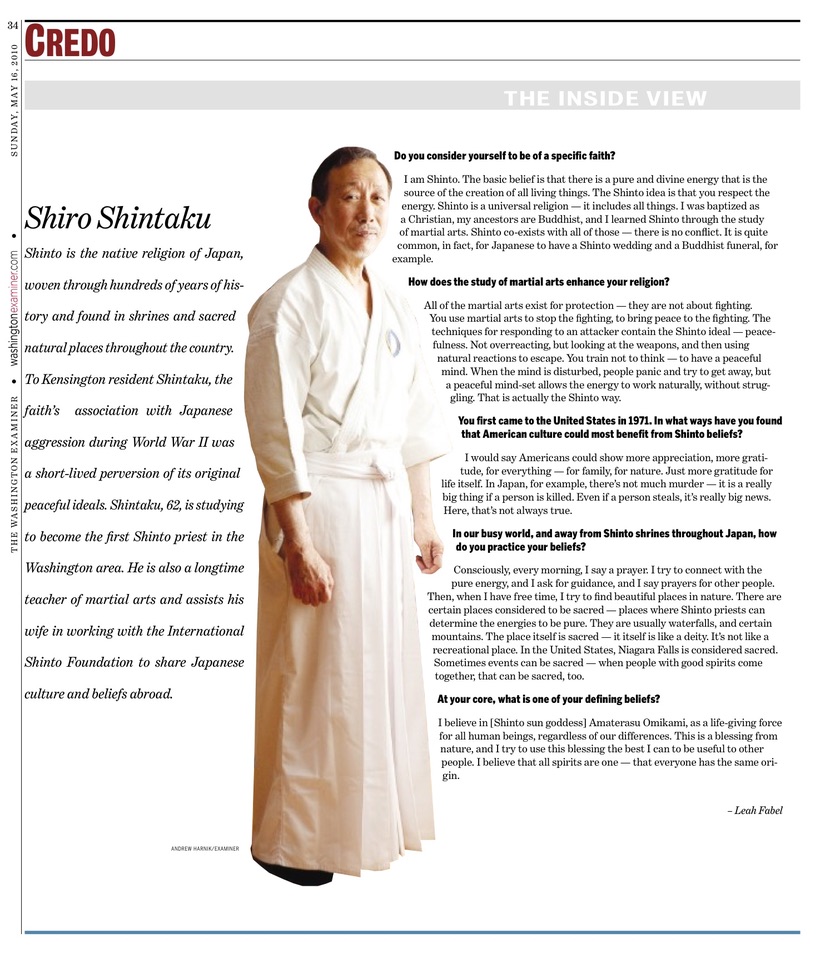Articles
By Leah Fabel, The Washington Examiner
| |
Credo: Shiro Shintaku
Shinto is the native religion of Japan, woven through hundreds of years of history and found in shrines and sacred natural places throughout the country. To Kensington resident Shiro Shintaku, the faith's association with Japanese aggression during World War II was a short-lived perversion of its original peaceful ideals. Shintaku, 62, is studying to become the first Shinto priest in the Washington area. He is also a longtime teacher of martial arts, and assists his wife in working with the International Shinto Foundation to share Japanese culture and beliefs abroad.
Do you consider yourself to be of a specific faith?
I am Shinto. The basic belief is that there is a pure and divine energy that is the source of the creation of all living things. The Shinto idea is that you respect the energy. Shinto is a universal religion -- it includes all things. I was baptized as a Christian, my ancestors are Buddhist, and I learned Shinto through the study of martial arts. Shinto co-exists with all of those -- there is no conflict. It is quite common, in fact, for Japanese to have a Shinto wedding and a Buddhist funeral, for example.
How does the study of martial arts enhance your religion?
All of the martial arts exist for protection -- they are not about fighting. You use martial arts to stop the fighting, to bring peace to the fighting. The techniques for responding to an attacker contain the Shinto ideal -- peacefulness. Not overreacting, but looking at the weapons, and then using natural reactions to escape. You train not to think -- to have a peaceful mind. When the mind is disturbed people panic and try to get away, but a peaceful mind-set allows the energy to work naturally, without struggling. That is actually the Shinto way.
You first came to the United States in 1971. In what ways have you found that American culture could most benefit from Shinto beliefs?
I would say Americans could show more appreciation, more gratitude, for everything -- for family, for nature. Just more gratitude for life itself. In Japan, for example, there's not much murder -- it is a really big thing if a person is killed. Even if a person steals, it's really big news. Here, that's not always true.
In our busy world, and away from Shinto shrines throughout Japan, how do you practice your beliefs?
Consciously, every morning, I say a prayer. I try to connect with the pure energy, and I ask for guidance, and I say prayers for other people. Then, when I have free time, I try to find beautiful places in nature. There are certain places considered to be sacred -- places where Shinto priests can determine the energies to be pure. They are usually waterfalls, and certain mountains. The place itself is sacred -- it itself is like a deity. It's not like a recreational place. In the United States, Niagara Falls is considered sacred. Sometimes events can be sacred -- when people with good spirits come together, that can be sacred, too.
At your core, what is one of your defining beliefs?
I believe in [Shinto sun goddess] Amaterasu Omikami, as a life-giving force for all human beings, regardless of our differences. This is a blessing from nature, and I try to use this blessing the best I can to be useful to other people. I believe that all spirits are one -- that everyone has the same origin.
 - Leah Fabel, Washington Examiner - Article
- Leah Fabel, Washington Examiner - Article
